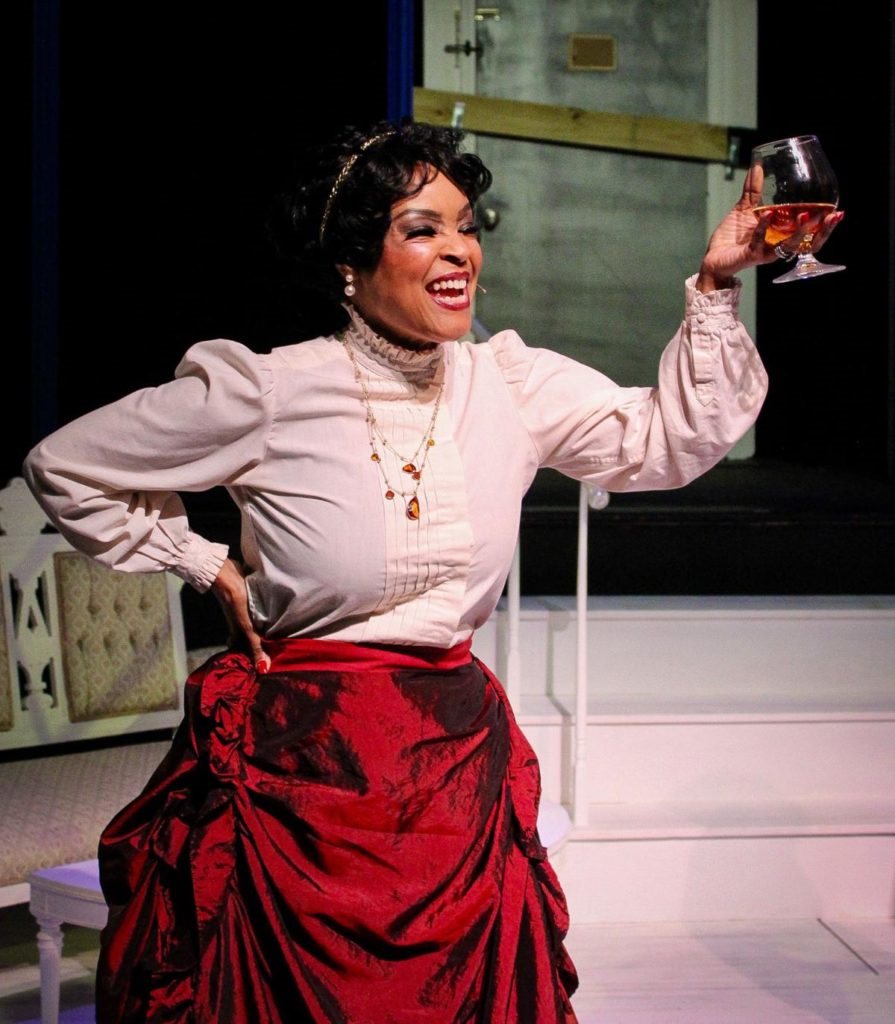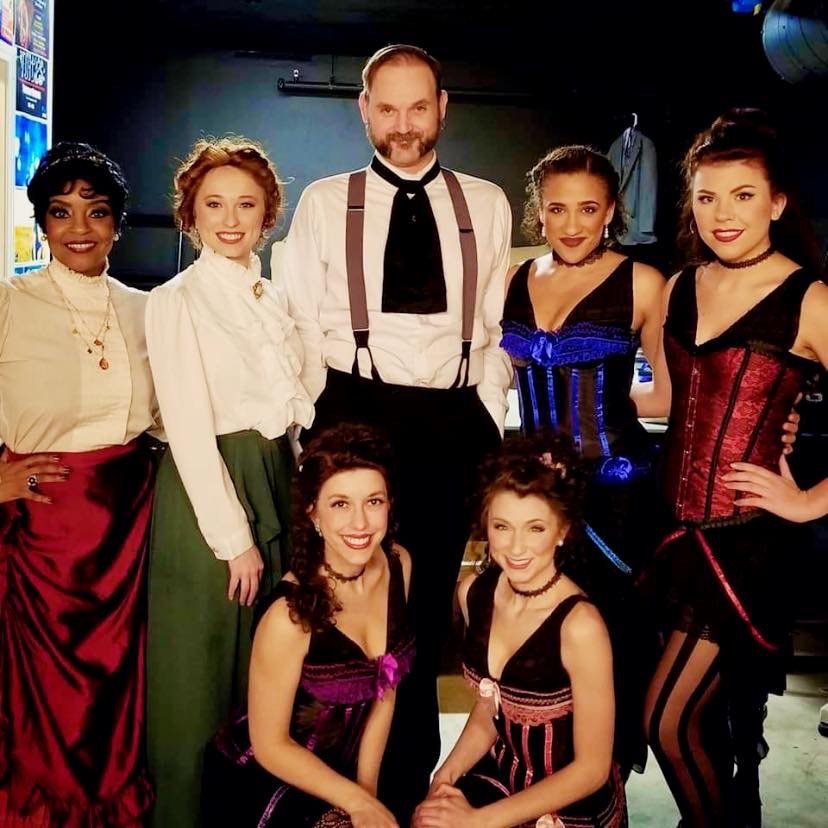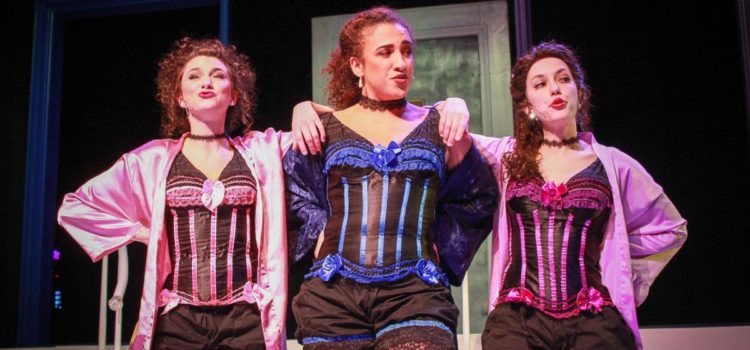By Lynn Venhaus
Ambitious and intriguing, “Madam” is a new musical full of promise and
potential.
Elevated by a charming cast of local performers, this vibrant musical cements
composer and music director Colin Healy as one to watch.
His fifth original musical, “Madam” showcases what a multi-talent he is — Healy
wrote the book, music and lyrics and did the orchestrations for his new Fly
North Theatricals company’s latest work. He also conducts a very tight band and
plays the piano.
With a lot of passion and heart behind it, “Madam” had a
triumphant sell-out run of nine performances last summer at the Bluff City
Theater in Hannibal, which commissioned the musical.
Now, St. Louisans has the opportunity to discover one of its most notorious
businesswomen from the 19th century, wealthy brothel madam and
philanthropist Eliza Haycraft. She built quite an empire, as the opening song
says, and became the richest woman in Missouri, beloved by the general public
during the Reconstruction Era.
Haycraft, born in 1820, arrived destitute in St. Louis at age 20. When prostitution was legal, for only a brief time, in St. Louis, she became owner and manager of a brothel, doing well even though she couldn’t read or write. She bought commercial and residential property and rented it back out. She was known for helping the city’s poor, offering them help and financial aid.
Healy’s crafted message is about the vulnerability of aging and
the power of saying “No.”
Haycraft empowered her courtesans by granting them the right to refuse service
to anyone. She had three simple rules: Respect, Consent and Pay Up Front.
“Madam” focuses on the last year of her life – she died in 1871 at age 51. While based on true events, the musical fictionalizes the story about a search for an heir to her sex empire when the richest and most powerful men were hellbent on taking it all away from her.
The passage of The Social Evils Act of 1870 made her business legitimate, but denied women affected by it of many of their rights they previously enjoyed.
The fascinating story’s conflicts must include the double standard conundrum – her houses were well-frequented by those rich guys who ran the city but she was shut out of polite society.
What the musical brings out in the small cast of female characters is their dependence on prostitution to support themselves and their independence by defying the status quo at a time when they had few legitimate rights – an early glimpse at feminism and sexism.
These characters are composites of strong spunky women – among them an escaped slave who disguised herself as a man to fight in the Union Army and a sister to Victoria Woodhull, a candidate for president in 1872.
Sunny Eileen Engel and Gracie Sartin, who have been with the production since its workshop, effortlessly strut with confidence in song and dance, smiles beaming as Tennie and Ripley.
They open the show, along with new addition Marta Bady as gutsy Billie,
with a vivacious “Empire.” The three are often paired in song – including “Love
Is Work,” “Another Fence (The Baseball Song)” and “The Great Benefactor.”
They aren’t the only working girls with gumption – Abigail Becker is the
complicated once-married Mercy Jones and Cameron Pille is the troubled Calista,
each with outstanding solos: Mercy in “A Man with Money” and “I Want to be a
Star,” and the sad “The Unfortunate Song” with The Benefactor (Phil Leveling),
and Calista with “It Feels So Good” and “Special.”
The women have moments to shine and plenty of melodic tunes to sing, and director Sydnie Grosberg Ronga has staged the musical numbers with verve in the small .Zack space, creating an intimacy by having performers up close on the ground and on the second level, not far from the audience.
Scenic designer George Shea has created a good space for the
action to flow, well-lit by lighting designer Kevin Bowman.
Healy knows the drawbacks of the .Zack’s acoustics, and his sound designer Tazu
Marshall has done a terrific job.
Choreographer Carly Niehaus has resolved the space challenges with streamlined numbers that punctuate the music. Eileen Engel also designed the costumes, and she made them extremely functional while period-appropriate.

The St. Louis cast is almost the same as the Hannibal cast minus
three. Kimmie Kidd-Booker, who played Madam in the COCA workshop and Billie in
Bluff City, resumes the leading role as man-hating Eliza. She is fierce and
feisty as this remarkable dignified woman in her declining final days.
With her rich, velvety voice, Kidd-Booker has become a welcome fixture in both
regional professional and community theater. She commands attention as she
sashays across the two-level set with major attitude, first introduced in “All
You Need to Know.” Her “No,” with Calista in the Part 1, and solo in Part 2, is
a hard-hitting high point.
She understands Eliza as a smart, pragmatic woman who knows how
to operate in a male-dominated world. Her mistrust of men reaches a
boiling point as they threaten to ruin her. Fuming, she joins Ripley and The
Benefactor in “The Social Evils Act.”
One of the three new cast members, Leveling has a fine voice but seems miscast
as the unsavory The Benefactor, an imposing bad guy and frequent customer. This
male chauvinist pig must be menacing and Phil is not that. In reality, maybe
it’s a good thing that he’s not believable being mean to women, but not for the
part – it is a sticky wicket. The role is a tad underwritten as it is.
While the music – infused with jazz and blues for a St. Louis flavor — is admirable, the book could use a little more tweaking – there are a few time leaps that are somewhat confusing
The musical is still a work in progress but the elements for success are there and will be going places.
Fly North Theatricals presents the local premiere of “Madam” from Jan. 10 to Feb. 2, with performances at 7:30 p.m. Thursday through Saturday and 2 p.m. Sunday at the .Zack Theater, 3224 Locust Street. For more information, visit www.flynorthmusic.com.


Lynn (Zipfel) Venhaus has had a continuous byline in St. Louis metro region publications since 1978. She writes features and news for Belleville News-Democrat and contributes to St. Louis magazine and other publications.
She is a Rotten Tomatoes-approved film critic, currently reviews films for Webster-Kirkwood Times and KTRS Radio, covers entertainment for PopLifeSTL.com and co-hosts podcast PopLifeSTL.com…Presents.
She is a member of Critics Choice Association, where she serves on the women’s and marketing committees; Alliance of Women Film Journalists; and on the board of the St. Louis Film Critics Association. She is a founding and board member of the St. Louis Theater Circle.
She is retired from teaching journalism/media as an adjunct college instructor.

